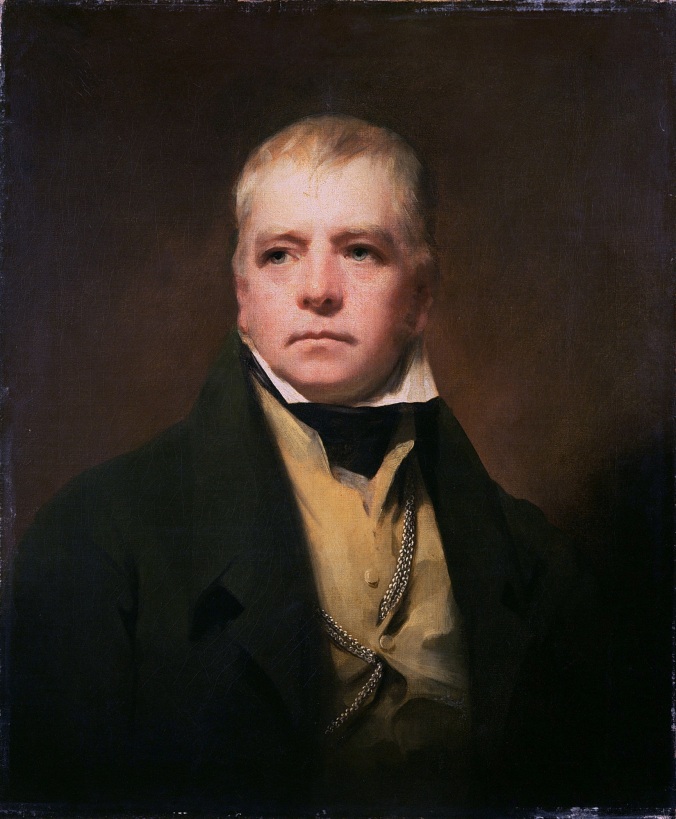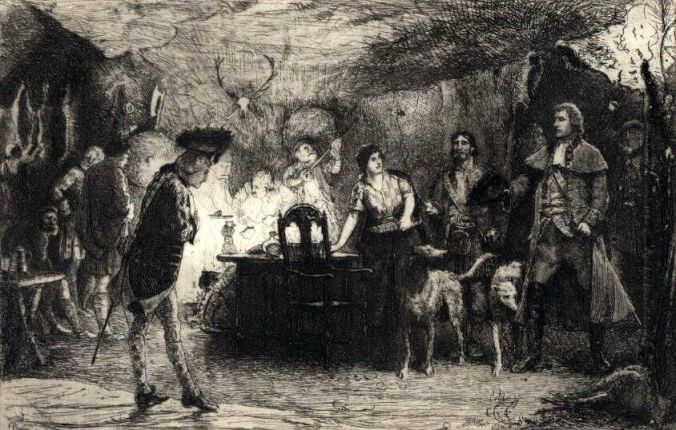Sir Walter had so large a hand in making Southern character, as it existed before the war, that he is in great measure responsible for the war. It seems a little harsh toward a dead man to say that we never should have had any war but for Sir Walter; and yet something of a plausible argument might, perhaps, be made in support of that wild proposition. The Southerner of the American Revolution owned slaves; so did the Southerner of the Civil War: but the former resembles the latter as an Englishman resembles a Frenchman. The change of character can be traced rather more easily to Sir Walter’s influence than to that of any other thing or person.
-Mark Twain, Life on the Mississippi
When i first ran across this passage many years ago, I found myself rather perplexed. How did the venerable literary figure Mark Twain end up indicting a Scottish Tory novelist an ocean away for the Civil War?

It was only upon reviewing the career of Sir Walter Scott did I realize my error. Much of Scott’s literary backdrops are undoubtedly romantic, featuring young heroes saving damsels in distress and fighting for country/clan, honor, and duty.
One striking example was Scott’s first novel, Waverley, about the fortunes of the young aristocratic soldier, Edward Waverley as he leaves his ancestral home for a commission in the Hanoverian army in Dundee, Scotland. It is the time period right before the Jacobite Uprising of 1745, when the Scottish Clans of the Highlands honor their ancient oaths to Bonnie Prince Charles Stuart and attempt to unseat the Hanoverian dynasty.

Through a series of mishaps, Waverley is accused of desertion and treason. He is rescued by the Clan Mac-Ivor due to his friendship with the Jacobite Baron Bradwardine. It is here that Waverley falls for the sister of Clan Mac-Ivor’s leader, the seductive and passionate Flora Mac-Ivor who urges him to throw in his lot with the Jacobite Uprising.
Without going further into the details of the plot, one can see the romantic tensions building. Will Waverley be loyal to the Hanoverian Crown or will he attempt to restore the Stuart monarchy? Will he follow Flora Mac-Ivor into rebellion or chose the love of the much calmer and sensible Rose Bradwardine? And will we ever get to see a good old Highland Charge against a modernized army?
Although critics in later years tended to be harsh about romantic writers like Walter Scott, we would do well to realize that during his time period – his works were consumed with abandon. Even great authors who have withstood the test of time found themselves as fans – such as in the case of Ms. Jane Austen
“Walter Scott has no business to write novels, especially good ones. – It is not fair. He has Fame and Profit enough as a Poet, and should not be taking the bread out of other people’s mouths.– I do not like him, and do not mean to like Waverley if I can help it – but fear I must”
Scott’s historical romantic fiction did not just draw only from his Scottish heritage which inspired other works like Redgauntlet and Rob Roy. He also made use of Britain’s shared medieval past as in the case of Ivanhoe. Here Scott mixes the legends of Robin Hood together with a tale of dispossessed Saxon noble Wilfred of Ivanhoe, whose allegiance to the Norman king Richard the Lionheart is a source of tension. Cue – Knights, Jousts, Robin Hood’s Merry Men, an eligible Saxon aristocratic beauty, an exotic Jewess healer, and of course these things aren’t complete without a Black Knight and a trial by combat.
Now I know what many of you are thinking – What does this have to do with Mark Twain’s quote written above?
Well, it comes down to a perennial theme running through many of Sir Walter Scott’s literary works: Heroic Ideals vs. Modern (Mechanized?) Society. The Weaker Side of this conflict, whether we are speaking of Scotts or Saxons, are poor and disenfranchised. But they possess many virtues such as Patriotism, deeply personal loyalties to their king and kin, veneration of hierarchy and social institutions, courage and chivalry.
The Weaker side’s cause is generally a Lost Cause, but that doesn’t prevent them from making some sort of positive gain which creates a kind of rapprochement with the Stronger and More Modern opposition. Perhaps they learn to be a little less Materialistic…
To the English Aristocracy of the 19th century, Scott’s romanticism is a celebration and remembrance of that old “economy of personal loyalty” which was being swept away not by radical French philosophes intent on shaking the world order – but by capitalism and industrialization.
Scott’s works were also quite popular in the Antebellum Old South. Just step back for a second and think on this point – young men were trained at birth to think of themselves akin to the Royalists Cavaliers who fought for the King during the English Civil War. They were laying claim to the same heritage as the English aristocracy to construct a kind of “world that never was.” Or as Mark Twain further remarked:
But for the Sir Walter disease, the character of the Southerner–or Southron, according to Sir Walter’s starchier way of phrasing it– would be wholly modern, in place of modern and medieval mixed, and the South would be fully a generation further advanced than it is. It was Sir Walter that made every gentleman in the South a Major or a Colonel, or a General or a Judge, before the war; and it was he, also, that made these gentlemen value these bogus decorations. For it was he that created rank and caste down there, and also reverence for rank and caste, and pride and pleasure in them. Enough is laid on slavery, without fathering upon it these creations and contributions of Sir Walter.